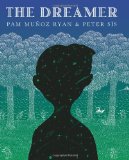by Pam Munoz Ryan
drawings by Peter Sis
Scholastic Press, New York, 2010. 372 pages.
Starred Review
Sonderbooks Stand-out 2010: #5 Children’s Fiction
2011 Pura Belpre Author Award
2010 Boston Globe-Horn Book Fiction Honor Book
I loved this book. I had hoped it would be a Newbery Honor Book, but can’t really complain because of the other awards it won. One thing I like about the Boston Globe-Horn Book Award is that they select based on the entire book, words and illustrations together and give the award to both the author and the illustrator, if both contributed to the complete book. In this book, the drawings work beautifully with the text to present a wonderfully poetical story.
This book is a novelization of the childhood of Pablo Neruda, who ended up being a great poet. Pablo Neruda was not his birth name, and we start out the book with a boy named Neftali, whose father thinks he daydreams far too much.
“On a continent of many songs, in a country shaped like the arm of a tall guitarrista, the rain drummed down on the town of Temuco.
“Neftali Reyes sat in his bed, propped up by pillows, and stared at the schoolwork in front of him. His teacher called it simple addition, but it was never simple for him. How he wished the numbers would disappear! He squeezed his eyes closed and then opened them.
“The twos and threes lifted from the page and waved for the others to join them. The fives and sevens sprang upward, and finally, after much prodding, the fours, ones, and sixes came along. But the nines and zeros would not budge, so the others left them. They held hands in a long procession of tiny figures, flew across the room, and escaped through the window crack. Neftali closed the book and smiled.
“He certainly could not be expected to finish his homework with only the lazy zeros and nines lolling on the page.”
Neftali is weak and shy. He stutters. His father is demanding and believes its shameful to spend your time daydreaming or writing.
The style of this book suits the subject. The language is poetical, and inserts some lines from actual poems by Pablo Neruda (with several complete poems at the back). When telling about his daydreams, the text may take on a shape or there may be an imaginative drawing from Peter Sis.
There is a plot, as Neftali learns to be the poet he was born to be, despite his father. But I think daydreamers will most enjoy the languid beauty of this book. It gives a leisurely and lovely look at the imaginative life of a child who notices things. Like me, readers will certainly want to read more of Pablo Neruda’s poetry.
Find this review on Sonderbooks at: www.sonderbooks.com/Childrens_Fiction/dreamer.html
Disclosure: I am an Amazon Affiliate, and will earn a small percentage if you order a book on Amazon after clicking through from my site.
Source: This review is based on a copy I got at ALA Annual Conference.
